disc change Alfa Romeo GT 2006 Owner handbook (in English)
[x] Cancel search | Manufacturer: ALFA ROMEO, Model Year: 2006, Model line: GT, Model: Alfa Romeo GT 2006Pages: 307, PDF Size: 6.05 MB
Page 57 of 307
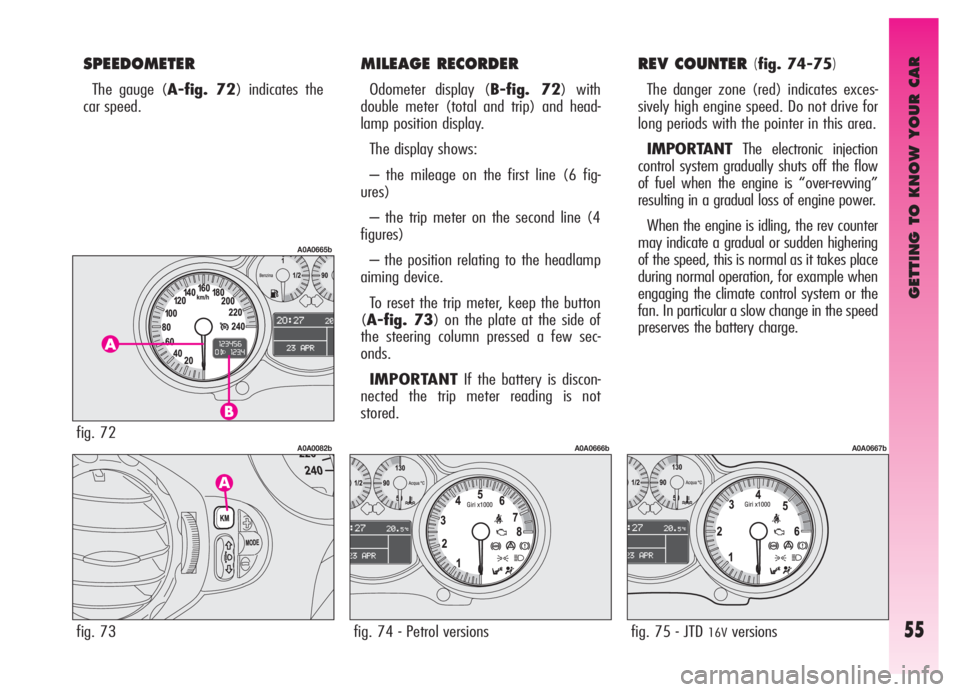
GETTING TO KNOW YOUR CAR
55
SPEEDOMETER
The gauge (A-fig. 72) indicates the
car speed.
MILEAGE RECORDER
Odometer display (B-fig. 72) with
double meter (total and trip) and head-
lamp position display.
The display shows:
– the mileage on the first line (6 fig-
ures)
– the trip meter on the second line (4
figures)
– the position relating to the headlamp
aiming device.
To reset the trip meter, keep the button
(A-fig. 73) on the plate at the side of
the steering column pressed a few sec-
onds.
IMPORTANTIf the battery is discon-
nected the trip meter reading is not
stored.
REV COUNTER (fig. 74-75)
The danger zone (red) indicates exces-
sively high engine speed. Do not drive for
long periods with the pointer in this area.
IMPORTANTThe electronic injection
control system gradually shuts off the flow
of fuel when the engine is “over-revving”
resulting in a gradual loss of engine power.
When the engine is idling, the rev counter
may indicate a gradual or sudden highering
of the speed, this is normal as it takes place
during normal operation, for example when
engaging the climate control system or the
fan. In particular a slow change in the speed
preserves the battery charge.
fig. 73
A0A0082b
fig. 74 - Petrol versions
A0A0666b
fig. 75 - JTD 16Vversions
A0A0667bfig. 72
A0A0665b
Page 155 of 307
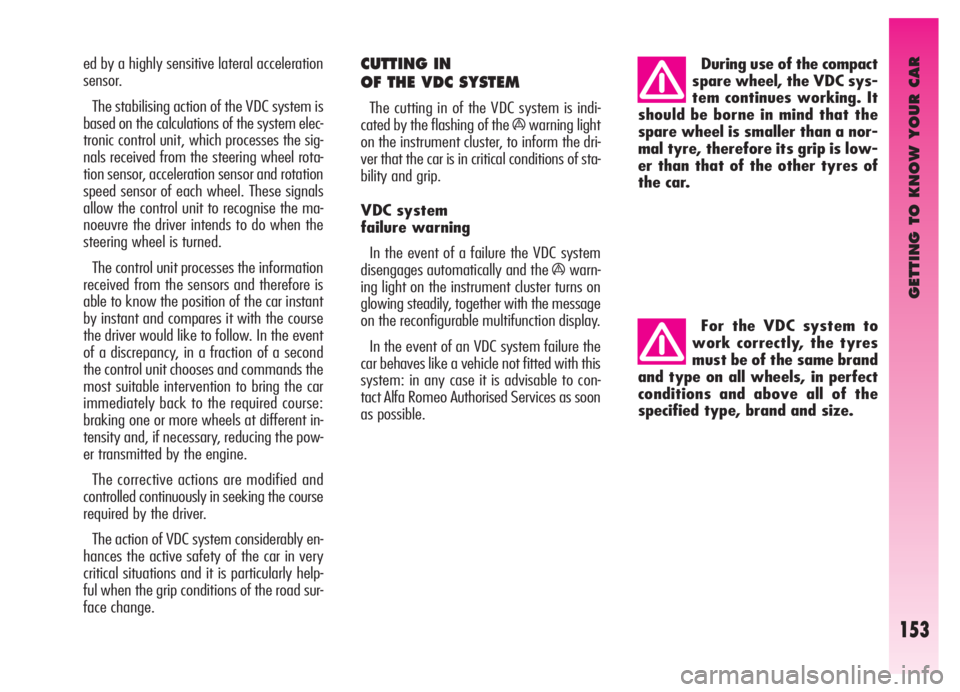
GETTING TO KNOW YOUR CAR
153
ed by a highly sensitive lateral acceleration
sensor.
The stabilising action of the VDC system is
based on the calculations of the system elec-
tronic control unit, which processes the sig-
nals received from the steering wheel rota-
tion sensor, acceleration sensor and rotation
speed sensor of each wheel. These signals
allow the control unit to recognise the ma-
noeuvre the driver intends to do when the
steering wheel is turned.
The control unit processes the information
received from the sensors and therefore is
able to know the position of the car instant
by instant and compares it with the course
the driver would like to follow. In the event
of a discrepancy, in a fraction of a second
the control unit chooses and commands the
most suitable intervention to bring the car
immediately back to the required course:
braking one or more wheels at different in-
tensity and, if necessary, reducing the pow-
er transmitted by the engine.
The corrective actions are modified and
controlled continuously in seeking the course
required by the driver.
The action of VDC system considerably en-
hances the active safety of the car in very
critical situations and it is particularly help-
ful when the grip conditions of the road sur-
face change.For the VDC system to
work correctly, the tyres
must be of the same brand
and type on all wheels, in perfect
conditions and above all of the
specified type, brand and size.CUTTING IN
OF THE VDC SYSTEM
The cutting in of the VDC system is indi-
cated by the flashing of the
áwarning light
on the instrument cluster, to inform the dri-
ver that the car is in critical conditions of sta-
bility and grip.
VDC system
failure warning
In the event of a failure the VDC system
disengages automatically and the
áwarn-
ing light on the instrument cluster turns on
glowing steadily, together with the message
on the reconfigurable multifunction display.
In the event of an VDC system failure the
car behaves like a vehicle not fitted with this
system: in any case it is advisable to con-
tact Alfa Romeo Authorised Services as soon
as possible.During use of the compact
spare wheel, the VDC sys-
tem continues working. It
should be borne in mind that the
spare wheel is smaller than a nor-
mal tyre, therefore its grip is low-
er than that of the other tyres of
the car.
Page 158 of 307

GETTING TO KNOW YOUR CAR
156
IMPORTANTAfter eliminating the in-
convenience, to check the system com-
pletely, Alfa Romeo Authorised Services are
obliged to run a bench test and, if necessary,
road tests which may also call for a long jour-
ney.
INTRODUCTION
The radio is fitted with CD player (radio
with Compact Disc player) or CD MP3 play-
er (radio with Compact Disc MP3 player)
and has been designed in accordance with
the specific features of the passenger com-
partment, with a personalised design that
blends with the style of the dashboard. The
radio dimensions are suitable for the car and
as it is of fixed type it cannot be installed on
any other vehicle.
The instructions for use also include how
to control the CD Changer (if fitted) through
the radio. For the instructions for use of the
CD Changer, refer to the specific manual.
ADVICE
Too high a volume when
driving can put the drivers
life at risk and that of oth-
er people. Therefore the volume
should always be adjusted in such
a way that it is always possible to
hear the noises of the surrounding
environment (e.g. horns, ambu-
lance, police sirens, etc.).
Road safety
You are advised to learn how to use the
various radio functions (e.g. storing stations)
before starting to drive.
Reception conditions
The reception conditions change constant-
ly when travelling. Reception may be dis-
turbed by the presence of mountains, build-
ings or bridges in particular if far away from
the broadcasting transmitter. If, turning the ignition key
to MAR, the warning light
Udoes not turn on or if,
while travelling it turns on glow-
ing steadily or flashing (on some
versions together with the mes-
sage + symbol on the reconfig-
urable multifunction display), con-
tact Alfa Romeo Authorised Ser-
vices as soon as possible.
RADIO WITH COMPACT DISC PLAYER
(Upon request for versions/markets where applicable)
Page 160 of 307

GETTING TO KNOW YOUR CAR
158
IMPORTANTDo not use the protective
sheets for CD in commerce or discs with sta-
bilisers, etc. as they might get stuck in the
internal mechanism and damage the disc.
IMPORTANT In case CDs protected by
copy are used, it is possible to wait for a few
seconds before the system starts playing
them.
New discs may be rough around the edges.
When these discs are used, the player
might not work or the sound might skip.
To remove the roughness from the edge of
the disc use a ball-point etc.
The radio is installed in a user-friendly po-
sition for the driver and the passenger and
the graphics on the front panel make loca-
tion of the controls quick, facilitating use
use.
The CD Changer for 10 discs, if present,
is housed in the left-hand side of the boot.
Below you will find the instructions for use,
which you are advised to read through care-
fully. GENERAL
The set possesses the following functions:
Radio section
– PLL tuning with FM/MW/LW frequen-
cy bands
– RDS (Radio Data System) with TA (traf-
fic information) - PTY (Program Type) - EON
(Enhanced Other Network) - REG (Regional
Programmes) functions
– Alternative frequency search selection in
RDS mode (AF function)
– Emergency alarm reception provision
– Automatic/manual station tuning
– Manual storage of 30 stations: 18 in
the FM band (6 in FM1, 6 in FM2, 6 in
FMT), 6 in the MW band and 6 in the LW
band
– Automatic storage (Autostore function)
of 6 stations in FMT band
– SENS DX/LO function (sensitivity ad-
justing in searching radio stations)
– Scan function (scanning stored stations)
– Automatic Stereo/Mono switching.Compact Disc section
– Disc select (disc n)
– Track select (forward/backward)
– Fast forward/backward
– Repeat function (repetition of last piece)
– Scan function (scanning the tracks on
the Compact Disc)
– Mix function (random playing)
– TPM function (storing CD track playing
sequence)
– CLR function (clearing CD track storage).
For installation and con-
nection of the CD-Changer
apply only to Alfa Romeo
Authorised Services.
Page 161 of 307

GETTING TO KNOW YOUR CAR
159
PROTECTION AGAINST THEFT
The radio is fitted with an antitheft pro-
tection system based on the exchange of in-
formation between the radio and the elec-
tronic control unit (Body Computer) installed
on the car. This system warrants the high-
est level of security and prevents entry of
the secret code every time the radio sup-
ply is disconnected.
After every re-connection an automatic
check procedure is performed during which
the display shows the wording “CAN-
CHECK” for about one second. If the result
of the check is positive, the set starts work-
ing, whereas if the comparison codes are
not the same or if the radio is connected for
the first time to the vehicle electric system,
the device informs the user of the need to
enter the secret code according to the pro-
cedure described in the following paragraph.
During the code entry procedure the dis-
play shows the word “CODE”. The set will
not work until the correct code is entered.
This way the protection system makes the
radio unusable after removal from the dash-
board in the case of theft. On multimedia CDs in ad-
dition to sound tracks also
data tracks are recorded.
Playing one of these CDs may cause
rustling at such a volume as to com-
promise road safety, as well as
causing damage to the final stages
and speakers.
Sound section
– Pause function
– Loudness function (excluding versions
with HI-FI BOSE sound system)
– 7 band graphic equaliser
– Separate bass/treble adjustment
– Right/left and front/rear channel bal-
ancing.
CAUTIONS
If it is very cold inside the car and the CD
player is used a little after turning the heater
on, a film of damp may form on the Com-
pact Disc or on the player optics and the
sound may not be perfect. In this case do
not use the CD player for at least an hour,
so that the condensation dissolves natural-
ly and normal operation is resumed.
Driving on rough roads with heavy vibra-
tions may cause skipping when the CD play-
er is working.
Page 162 of 307
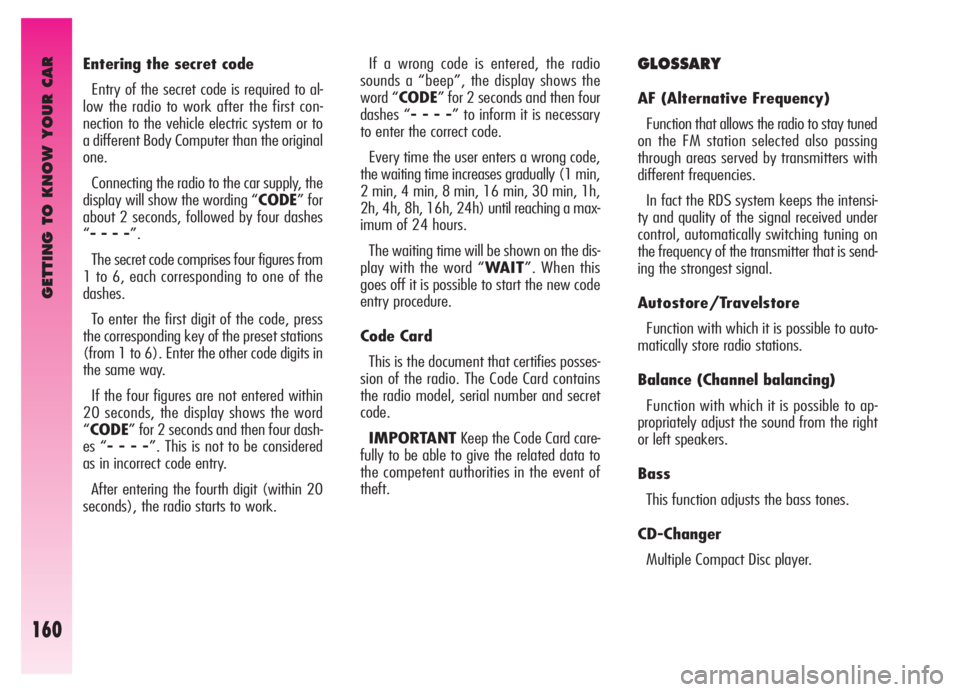
GETTING TO KNOW YOUR CAR
160
Entering the secret code
Entry of the secret code is required to al-
low the radio to work after the first con-
nection to the vehicle electric system or to
a different Body Computer than the original
one.
Connecting the radio to the car supply, the
display will show the wording “CODE” for
about 2 seconds, followed by four dashes
“- - - -”.
The secret code comprises four figures from
1 to 6, each corresponding to one of the
dashes.
To enter the first digit of the code, press
the corresponding key of the preset stations
(from 1 to 6). Enter the other code digits in
the same way.
If the four figures are not entered within
20 seconds, the display shows the word
“CODE” for 2 seconds and then four dash-
es “- - - -”. This is not to be considered
as in incorrect code entry.
After entering the fourth digit (within 20
seconds), the radio starts to work.If a wrong code is entered, the radio
sounds a “beep”, the display shows the
word “CODE” for 2 seconds and then four
dashes “- - - -” to inform it is necessary
to enter the correct code.
Every time the user enters a wrong code,
the waiting time increases gradually (1 min,
2 min, 4 min, 8 min, 16 min, 30 min, 1h,
2h, 4h, 8h, 16h, 24h) until reaching a max-
imum of 24 hours.
The waiting time will be shown on the dis-
play with the word “WAIT”. When this
goes off it is possible to start the new code
entry procedure.
Code Card
This is the document that certifies posses-
sion of the radio. The Code Card contains
the radio model, serial number and secret
code.
IMPORTANTKeep the Code Card care-
fully to be able to give the related data to
the competent authorities in the event of
theft.GLOSSARY
AF (Alternative Frequency)
Function that allows the radio to stay tuned
on the FM station selected also passing
through areas served by transmitters with
different frequencies.
In fact the RDS system keeps the intensi-
ty and quality of the signal received under
control, automatically switching tuning on
the frequency of the transmitter that is send-
ing the strongest signal.
Autostore/Travelstore
Function with which it is possible to auto-
matically store radio stations.
Balance (Channel balancing)
Function with which it is possible to ap-
propriately adjust the sound from the right
or left speakers.
Bass
This function adjusts the bass tones.
CD-Changer
Multiple Compact Disc player.
Page 166 of 307

GETTING TO KNOW YOUR CAR
164
11. 5-MIXFunction select button:
– Call station no. 5
– Store station no. 5
– Random CD track playing
12. 4-RPTFunction select button:
– Call station no. 4
– Store station no. 4
– Continuous CD track playing
13. BN-ASRadio frequency range select
function (FM1, FM2, FMT,
MW, LW) - Autostore
14. SRC-SCOperating mode select button
Radio - Compact Disc - CD-
Changer and Scan function
(hearing stations in se-
quence)
15. 3-IIFunction select button:
– Call station no. 3
– Store station no. 3
– CD playing pause
16. 2-CLRFunction select button:
– Call station no. 2
– Store station no. 2
– CLR function (CD track stor-
age clearing)17. 1-TPMFunction select button:
– Call station no. 1
– Store station no. 1
– TPM function (storing CD
playing sequence)
18. AUD-LDSound function select button:
bass tones, treble tones,
right/left and front/rear bal-
ancing and Loudness (ex-
cluding versions with HI-FI
BOSE sound system)
19. VOL-Volume lowering button
20. ON-
zFunction select button:
– Set on/off
– Mute on/off
21. VOL+Volume highering button
CONTROLS ON THE STEERING
WHEEL
(fig. 155)
The main radio function controls are re-
peated on the steering wheel, to allow eas-
ier control.
1.Volume increase button
2.Volume decrease button
3.Mute button
4.Radio frequency range select button
(FM1, FM2, FMT, MW, LW) and avail-
able sources (Radio - Compact Disc - CD-
Changer)
5.Multifunction button:
– Radio: call preset stations (from 1 to
6)
– Compact Disc player: select next piece
fig. 155
A0A0640b
Page 167 of 307
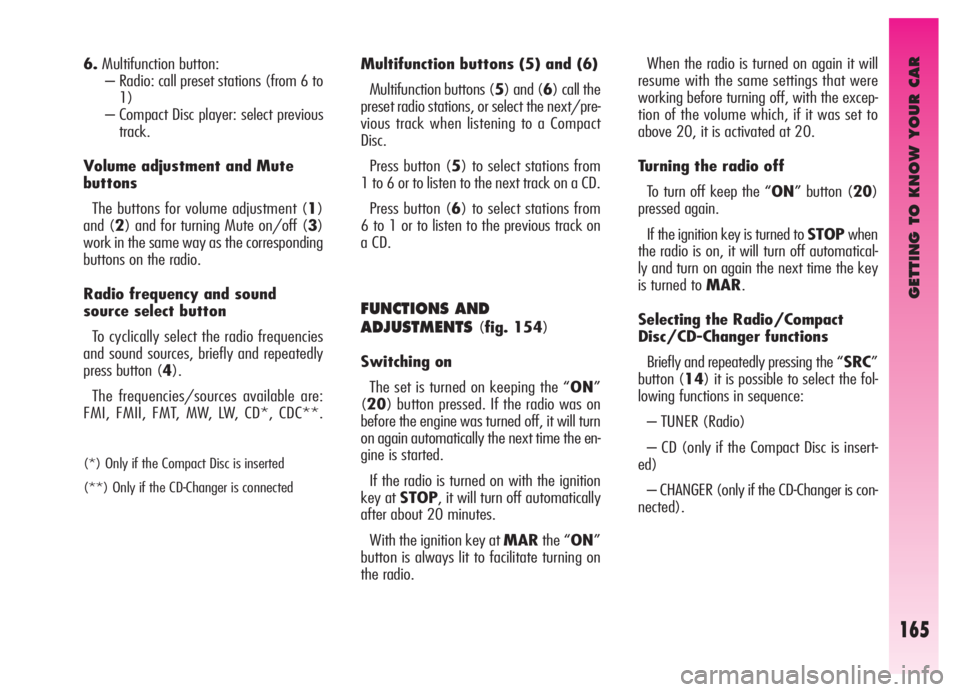
GETTING TO KNOW YOUR CAR
165
6.Multifunction button:
– Radio: call preset stations (from 6 to
1)
– Compact Disc player: select previous
track.
Volume adjustment and Mute
buttons
The buttons for volume adjustment (1)
and (2) and for turning Mute on/off (3)
work in the same way as the corresponding
buttons on the radio.
Radio frequency and sound
source select button
To cyclically select the radio frequencies
and sound sources, briefly and repeatedly
press button (4).
The frequencies/sources available are:
FMI, FMII, FMT, MW, LW, CD*, CDC**.
(*) Only if the Compact Disc is inserted
(**) Only if the CD-Changer is connected
Multifunction buttons (5) and (6)
Multifunction buttons (5) and (6) call the
preset radio stations, or select the next/pre-
vious track when listening to a Compact
Disc.
Press button (5) to select stations from
1 to 6 or to listen to the next track on a CD.
Press button (6) to select stations from
6 to 1 or to listen to the previous track on
a CD.
FUNCTIONS AND
ADJUSTMENTS
(fig. 154)
Switching on
The set is turned on keeping the “ON”
(20) button pressed. If the radio was on
before the engine was turned off, it will turn
on again automatically the next time the en-
gine is started.
If the radio is turned on with the ignition
key at STOP, it will turn off automatically
after about 20 minutes.
With the ignition key at MARthe “ON”
button is always lit to facilitate turning on
the radio.When the radio is turned on again it will
resume with the same settings that were
working before turning off, with the excep-
tion of the volume which, if it was set to
above 20, it is activated at 20.
Turning the radio off
To turn off keep the “ON” button (20)
pressed again.
If the ignition key is turned to STOPwhen
the radio is on, it will turn off automatical-
ly and turn on again the next time the key
is turned to MAR.
Selecting the Radio/Compact
Disc/CD-Changer functions
Briefly and repeatedly pressing the “SRC”
button (14) it is possible to select the fol-
lowing functions in sequence:
– TUNER (Radio)
– CD (only if the Compact Disc is insert-
ed)
– CHANGER (only if the CD-Changer is con-
nected).
Page 168 of 307
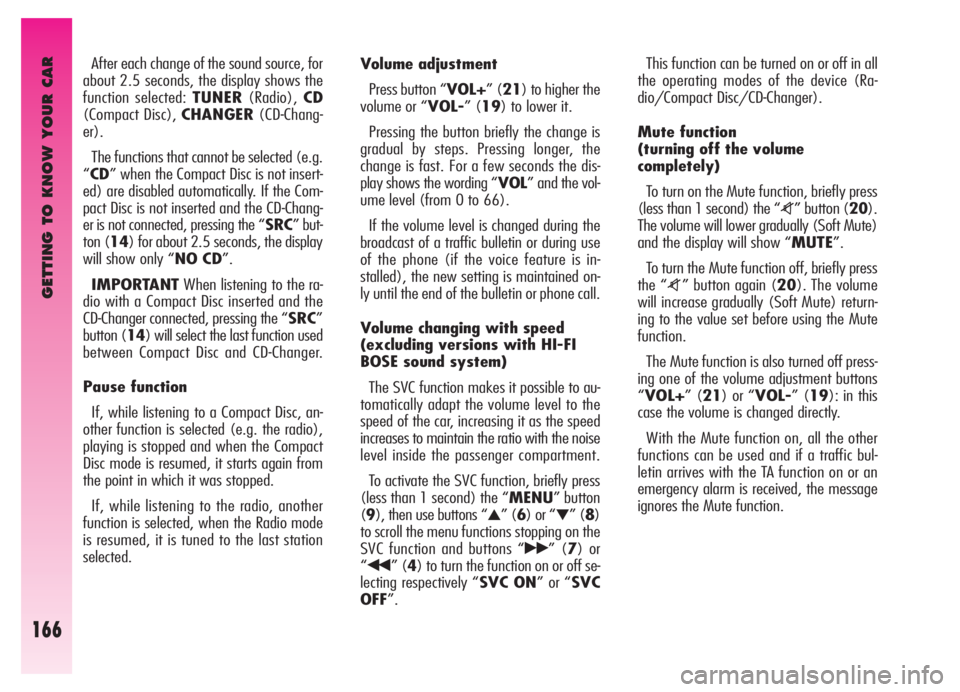
GETTING TO KNOW YOUR CAR
166
After each change of the sound source, for
about 2.5 seconds, the display shows the
function selected: TUNER(Radio),CD
(Compact Disc), CHANGER(CD-Chang-
er).
The functions that cannot be selected (e.g.
“CD” when the Compact Disc is not insert-
ed) are disabled automatically. If the Com-
pact Disc is not inserted and the CD-Chang-
er is not connected, pressing the “SRC” but-
ton (14) for about 2.5 seconds, the display
will show only “NO CD”.
IMPORTANTWhen listening to the ra-
dio with a Compact Disc inserted and the
CD-Changer connected, pressing the “SRC”
button (14) will select the last function used
between Compact Disc and CD-Changer.
Pause function
If, while listening to a Compact Disc, an-
other function is selected (e.g. the radio),
playing is stopped and when the Compact
Disc mode is resumed, it starts again from
the point in which it was stopped.
If, while listening to the radio, another
function is selected, when the Radio mode
is resumed, it is tuned to the last station
selected.Volume adjustment
Press button “VOL+” (21) to higher the
volume or “VOL-” (19) to lower it.
Pressing the button briefly the change is
gradual by steps. Pressing longer, the
change is fast. For a few seconds the dis-
play shows the wording “VOL” and the vol-
ume level (from 0 to 66).
If the volume level is changed during the
broadcast of a traffic bulletin or during use
of the phone (if the voice feature is in-
stalled), the new setting is maintained on-
ly until the end of the bulletin or phone call.
Volume changing with speed
(excluding versions with HI-FI
BOSE sound system)
The SVC function makes it possible to au-
tomatically adapt the volume level to the
speed of the car, increasing it as the speed
increases to maintain the ratio with the noise
level inside the passenger compartment.
To activate the SVC function, briefly press
(less than 1 second) the “MENU” button
(9), then use buttons “
▲” (6) or “▼” (8)
to scroll the menu functions stopping on the
SVC function and buttons “
˙˙” (7) or
“
¯¯” (4) to turn the function on or off se-
lecting respectively “SVC ON” or “SVC
OFF”.This function can be turned on or off in all
the operating modes of the device (Ra-
dio/Compact Disc/CD-Changer).
Mute function
(turning off the volume
completely)
To turn on the Mute function, briefly press
(less than 1 second) the “
z” button (20).
The volume will lower gradually (Soft Mute)
and the display will show “MUTE”.
To turn the Mute function off, briefly press
the “
z” button again (20). The volume
will increase gradually (Soft Mute) return-
ing to the value set before using the Mute
function.
The Mute function is also turned off press-
ing one of the volume adjustment buttons
“VOL+” (21) or “VOL-” (19): in this
case the volume is changed directly.
With the Mute function on, all the other
functions can be used and if a traffic bul-
letin arrives with the TA function on or an
emergency alarm is received, the message
ignores the Mute function.
Page 170 of 307
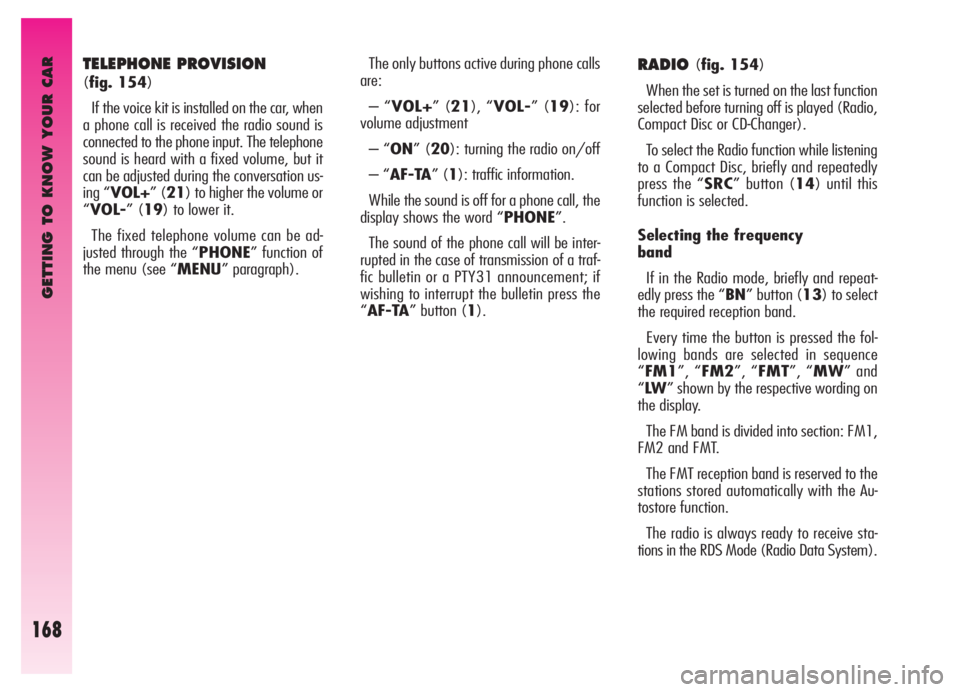
GETTING TO KNOW YOUR CAR
168
TELEPHONE PROVISION
(fig. 154)
If the voice kit is installed on the car, when
a phone call is received the radio sound is
connected to the phone input. The telephone
sound is heard with a fixed volume, but it
can be adjusted during the conversation us-
ing “VOL+” (21) to higher the volume or
“VOL-” (19) to lower it.
The fixed telephone volume can be ad-
justed through the “PHONE” function of
the menu (see “MENU” paragraph). The only buttons active during phone calls
are:
– “VOL+” (21), “VOL-” (19): for
volume adjustment
– “ON” (20): turning the radio on/off
– “AF-TA” (1): traffic information.
While the sound is off for a phone call, the
display shows the word “PHONE”.
The sound of the phone call will be inter-
rupted in the case of transmission of a traf-
fic bulletin or a PTY31 announcement; if
wishing to interrupt the bulletin press the
“AF-TA” button (1).
RADIO(fig. 154)
When the set is turned on the last function
selected before turning off is played (Radio,
Compact Disc or CD-Changer).
To select the Radio function while listening
to a Compact Disc, briefly and repeatedly
press the “SRC” button (14) until this
function is selected.
Selecting the frequency
band
If in the Radio mode, briefly and repeat-
edly press the “BN” button (13) to select
the required reception band.
Every time the button is pressed the fol-
lowing bands are selected in sequence
“FM1”, “FM2”, “FMT”, “MW” and
“LW” shown by the respective wording on
the display.
The FM band is divided into section: FM1,
FM2 and FMT.
The FMT reception band is reserved to the
stations stored automatically with the Au-
tostore function.
The radio is always ready to receive sta-
tions in the RDS Mode (Radio Data System).